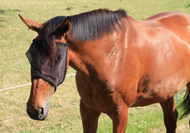Summer is almost here! Frolicking in green fields, strutting their stuff and groomed to perfection in the show ring, trotting down leafy country lanes - summer is a fun season for horses, you'd think.
Our Horses (Copyright Totally Tack)
Ask any horse though and if they could, they'd tell you: their joy of summer is blighted by billions of flies and midges that invade eyes and ears (not to mention other orifices), crawl across their bodies, bite their legs and generally cruelly curb their pastoral pleasure.
There's not much your horse can do, apart from twitching and flicking his mane and tail, to keep himself fly free, so he depends on you to make him as comfortable and resilient as possible in the face of this plague.
Flies Dine on the Dirty Stuff
Flies follow your horses because their main purpose is to clean up behind them! Flies (especially their larvae - maggots) enjoy dining on all the dirty stuff that horses (and all animals) produce - manure, sweat, old bedding, secretions, spilled feed and the like. So the first line of defence is to keep your horse and his environment as clean and dry (stable cleaning) as possible, so there is nowhere appealing for flies to lay eggs and breed.
Of course no matter how diligent you are, you won't ever eliminate flies completely, so you need to help your horse in other ways too.
Help your Horse
From the horse's point of view probably the most annoying fly of all is the Face Fly (Musca autumnalis). Closely related to the house fly, the adult version of this persistent pest likes to feed on secretions around the eyes, mouth, and nostrils of horses and cattle. They can cause problems beyond irritation, because they spread parasitic eyeworm infection.
It's wise, therefore, to make sure your horse's face is protected with a good quality fly mask while he's out and about in the warm months. Keep his face clean and use fly repellents.
Also particularly nasty is the Stable Fly (Stomoxys calcitrans), which literally makes your horse stamp his feet. These little vampires like to bite horse's legs and suck their blood. They can spread Equine Infectious anemia as they flit about, so keep them at bay with fly traps and appropriate fly repellents.
Blood Suckers
Horse flies (Hybomitra micans), which can grow up to an inch and a quarter long, are also blood-suckers. Although they generally feed innocently on nectar, the females need a hefty blood meal in order to reproduce, and their bite can be very painful when they pick your horse to gorge on. If the horse is visited by a swarm of these flies anemia could occur, not to mention skin problems from allergic reactions and sores developing from the bites themselves. You'll need fly ointment, spray on repellents and, if fly infestation is severe, a flyrug, to keep your horse safe.
Possibly the most dreaded fly of all is the Bot Fly (Gasterophilus) which lays its eggs most commonly on the forelegs, chest and head of horses during the summer. You can spot these as little yellow dots on the coat, and if you're wise you'll remove them with a Bot knife as soon as you see them.
Horses infested with Bot Fly eggs usually lick and bite at themselves, stimulating the Bot eggs to hatch. Many of the larvae manage to get themselves ingested, and eventually end up in the stomach of the horse, where in the following spring they are passed out with the faeces, fledging into adult flies in time to repeat the cycle.

Removing Bot Eggs
The larvae in the stomach can cause the horse symptoms such as loss of condition, raised temperature, restlessness, lack of appetite, intermittent diarrhoea or constipation, and even stomach ulcers and fatal peritonitis.
Once Bot Fly has infested your horse it can be treated by worming (even though it is not a worm). Prevention is better than cure, so remove Bot eggs from the coat daily and worm in the winter.
In general it is best to turn horses out after dark in summer, when flies are not active, but remember that midges - tiny flies that can cause big trouble - tend to be active in clouds at dusk and dawn, and enjoy stagnant pools of water.
The term "midges" is actually a generic word that applies to numerous species of minute flying insects. The midge that causes most trouble for horses is Culicoides, whose bite causes Sweet Itch in susceptible animals.
Keep your horse fly free and happy as the weather warms up! Totally Tack is here to help. Call us for advice about fly defence.



